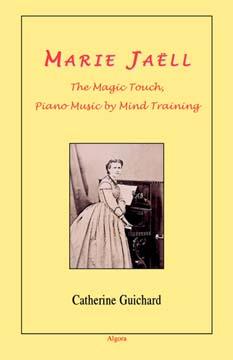
Sound Bite
Marie Ja�ëll was a world-renowned piano prodigy, composer, and influential teacher. Admired by Liszt, Saint Sa�ëns and Paul Val�éry, she was at the center of a revolution in musical pedagogy. As a brilliant pianist, she was the first to interpret all of Liszt. This book weaves together three themes: the cultural life of nineteenth-century Europe, the Romantic vision of music that finds its fullest expression in piano sounds, and Marie Ja�ëll's creativity in piano pedagogy.
About the Author
Catherine Guichard, a piano teacher herself for more than twenty years, lives in Paris. She is a director of the bi-annual Marie Jaëll Music Festival in Strasbourg.
|
|
About the Book
Marie Ja�ëll was a musician of exceptional destiny. A piano prodigy, composer, and revolutionary pedagogue, her career exemplifies the optimism, the excitement and the intellectual passion that swept the world as 19th-century Romanticism...
Marie Ja�ëll was a musician of exceptional destiny. A piano prodigy, composer, and revolutionary pedagogue, her career exemplifies the optimism, the excitement and the intellectual passion that swept the world as 19th-century Romanticism acquired the tools and methods of modern science to explore and improve human life.
Born in 1846, Ja�ëll lived through an epoch in full upheaval, an epoch of sweeping economic and social changes. Revolutionary ideas were bursting forth but society was still anchored by the roots of tradition. Vibrant Romanticism renewed literature and poetry, and painting broke loose from old conventions and embraced an impressionist style. Music seemed to lag behind; then, suddenly, harmony took bold steps and French music in particular took off, with innovations in timbres, rhythms and audacious harmonic combinations. Technical improvements in the construction of keyboard instruments permitted and at the same time inspired more colorful composition and more nuanced musical technique.
Admired by Liszt, Saint Sa�ëns and Paul Val�éry, Marie Ja�ëll was at the center of a revolution in musical pedagogy. As a brilliant pianist, she was the first to interpret all of Liszt. At the apogee of her famous career, she quit concert performing and threw herself into mastering the piano in a scientific way by applying rigorous methodology. She reinvented herself as a scientist. What seemed before to be a matter of individual luck and "good days" in playing piano, she turned into a subject of formal mental training. She documented how one can draw forth crystalline sounds from the piano on a conscious basis.
While talent remains a powerful ingredient in the art of music, it could now be enhanced by a powerful methodology. Marie Ja�ëll's analytical breakthroughs have helped pianists perfect their touch, drawing forth more beautiful musical sonority.
Bibliography, Index
|
Preface
Marie Jaëll’s insights, ever since I discovered them as a student, have been a source of inspiration for my teaching. They implanted in me her passion for the piano. I try now to instill that passion into my students. Hopefully, this...
Marie Jaëll’s insights, ever since I discovered them as a student, have been a source of inspiration for my teaching. They implanted in me her passion for the piano. I try now to instill that passion into my students. Hopefully, this book captures that passion and brings to life a deeply spiritual and lovable personality. Probably referring to the violin, Shakespeare asks, “How is it that cat guts can hail the souls from men’s bodies?” In the same vein one wonders how a piano can set anyone on fire. As musical instruments go, it is gigantic and its cast-iron frame houses a concentrated tension of over twenty tonnes.1 Yet it pours forth crystalline sounds that move man in his inmost being.
But the piano has a double parentage. It was born of musicians’ drive to exploit harmony in order to express personal emotions; and it is also a prized product of the Industrial Revolution. Thus, it is a paradox that a “monster of modern technology” should hold the key to “a purely spiritual universe, a system of ideally moving forces.”
Marie Jaëll grappled with that mystery throughout her life, and she came to the conclusion that the true instrument of music is not the piano, but the pianist, himself. Her guide in her life-long endeavor was Franz Liszt, the arch-Romantic, and his shadow loomed large in her life….
|
|
Pages 236
Year: 2004
LC Classification: ML417.J342G85
Dewey code: 786.2'092'dc22
BISAC: BIO004000
BISAC: MUS506000
Soft Cover
ISBN: 978-0-87586-305-4
Price: USD 21.95
Hard Cover
ISBN: 978-0-87586-306-1
Price: USD 26.95
Ebook
ISBN: 978-0-87586-307-8
Price: USD 21.95
|













